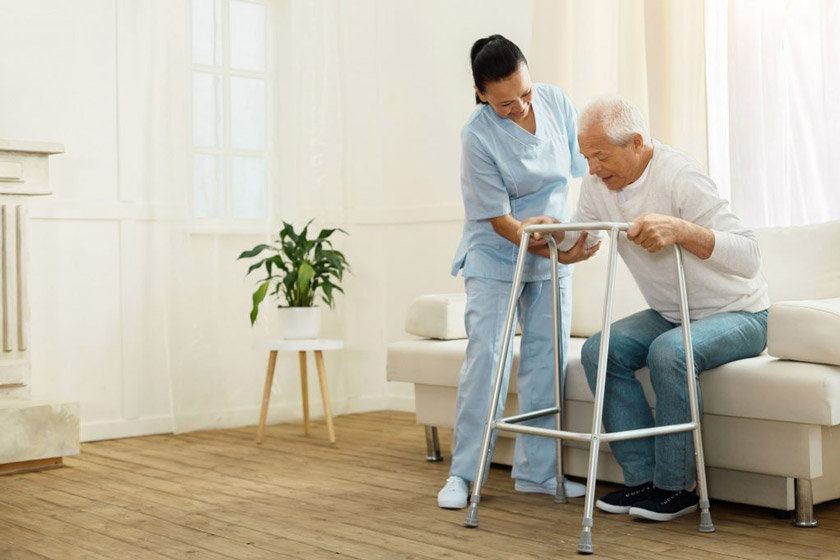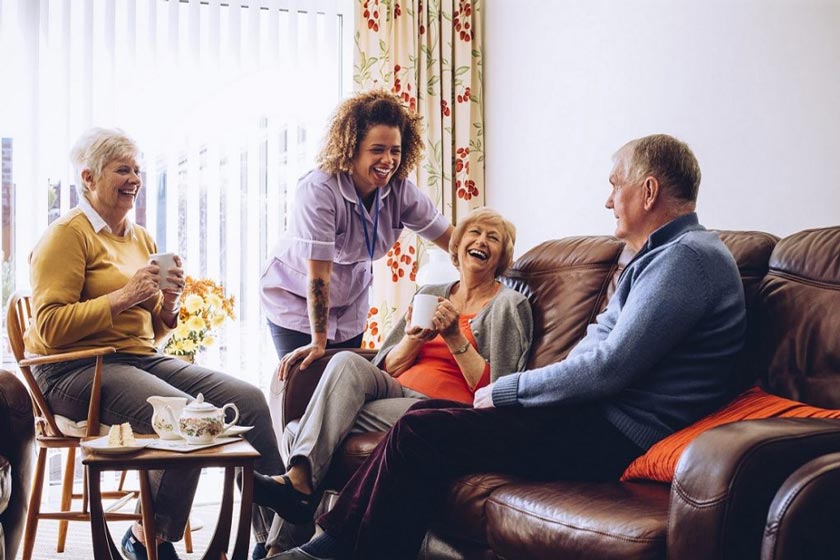
Taking Care of the Elderly: Key Roles and Responsibilities of Geriatric Nurses
The roles of nurses for the elderly have been demanding in today’s world. The type of care that the elderly need is specific to their ages, and the nurses must provide appropriate care based on their needs. Caring for the elderly is similar to caring for a baby since they share many similarities.
Some seniors are cared for at their own houses, while some live in special caring centers for the elderly. Hiring a senior expert nurse is one of the options in caring for the elderly. The elderly have many responsibilities that must be met with patience, understanding the elderly condition, and spending a lot of time nursing. At present, nurses have different roles to perform. In this article, we talk about the role of nurses in the care of the elderly.
Contents
Role of Nurse in Elderly Care
As a counsellor, you need to learn how to talk to the elderly, listen to them, and pay attention to their feelings if they need counselling. That makes the nurses know her client better, which reduces the sense of insecurity in the elderly.
As a teacher, the nurse should inform the elderly about a healthy lifestyle to prevent possible diseases. Through teaching, the nurses can help them take better care of themselves. The nurse taking care of the elderly should provide information about personal hygiene and manage proper nutrition and medication. These can help the elderly be independent in some aspects of their daily lives.
The nurses can also act as a supporter. In this regard, the elderly nurse can explain and inform the elderly about the social services, programs, benefits, and rights they can enjoy.
As a program coordinator, the nurse directly contacts the patient to coordinate and manage treatment, rehabilitation, or other old adult-related programs. Besides, the nurse communicates and coordinates the elderly with other treatment team members. The proper coordination of the nurse can ensure the general health of the senior.
Other Effective Measures and Roles of the Senior’s Nurses

The nurses are responsible for monitoring vital signs and creating a safe, clean, and healthy environment for the patient. The nurse cares for seniors’ social, intellectual, spiritual, physical, and emotional well-being. Personal hygiene, such as toileting, cleaning, dressing and bathing, and doing things they cannot do, is necessary. The nurse prescribes meals and prepares them according to the doctor’s instructions.
The elderly nurse has to take care of the patient in the early morning and afternoon and care for them even when asleep. They should prepare and administer medications and ensure that the elderly take adequate medicines. And if the older adult is allergic to a particular drug or does not tolerate any drug’s side effects, the nurse should inform the doctor.
The elderly nurse should be careful not to get too close to them, but emotional support can be beneficial. That can sometimes be difficult because the nurse must listen and show genuine empathy. The elderly may have problems with their family members, and in that case, they may need someone to talk to, so the nurse should be a good listener. The common mental disorders in the elderly can be treated with the help of these people.
The Roles of the Nurses During Rehabilitation Services of the Elderly
In some cases, the elderly might need rehabilitative services like physiotherapy. The nurse also coordinates the appointments and participates in a doctor’s visit at home. The nurse should help them with daily chores, especially if the patient has difficulty moving.
Nursing the elderly is a challenging job, and we should always look for an approach that manages the elderly’s care and provides a healthier and more comfortable life for them. And since each person is entirely different, they must design and implement this unique approach for each older adult. The best way for the nurse is to learn these techniques as much as possible to apply what they have learned without being impressed. Nurses should also take care of their own health when caring for the elderly.

The Roles of the Nurses in Socializing the Elderly
Researchers have conducted many studies on the nurse’s role in the mental health of the elderly and overall improvement. Socialization and social relationships are among the most important and influential factors in old adults’ mental health. Socialization means maintaining and expanding social relationships. The nurse can take care of the seniors and prevent them from becoming isolated while being with them. Also, a nurse is familiar with ways to develop the social relationships of the seniors.
As a result, nurses can purposefully place the elderly in more social situations and expand their social relationships. Imagine the long, narrow, neutral corridors of nursing homes. He sees a group of older people sitting in wheelchairs, their heads down, never raising their heads to the nurses who rush along the corridor to get to the emergency room. That is not proper socialization. It is to isolate them. In such places, the seniors in closed environments do not have good quality socializing, although they are among others.
Social Interactions for Good Health
The need to maintain social interactions for good health is quite clear. Training and educating the nurses is one of the basic principles taught to them. Thus, the senior nurse becomes familiar with socialization principles and their implications for health and well-being. The study, published in the annual Journal of Family Medicine, looked at about 200 older adults with depression symptoms and predicted social visits and physical activity for six months. The results were undeniable. “Social communication can be just as effective in improving quality of life as physical activity,” wrote one researcher. “Social participation and social support networks have played a significant role in maintaining the mental health of the elderly and their treatment outcomes.”
These networks include friends, family members, and more. But if the elderly do not have such connections, the elderly nurses should help revitalize new relationships. In addition to being a member of groups, the nurse helps expand the patient’s support connections. Social support networks are essential.

According to the American Alzheimer’s Association, social participation can boost brain health and delay the risk of dementia. The American Academy of Neurology has studied the relationship between dementia, stress, and socialization and found that “people who are socially active and not easily affected by stress are less likely to develop dementia.” The elderly nurse’s responsibilities are crucial here. The nurses should be able to remove stressors from the seniors.
It should also promote the patient’s self-confidence and encourage them to participate in society. Therefore, a senior nurse can play a beneficial role in increasing the elderly patient’s life expectancy. There are many ways to help keep the elderly healthy.
Conclusion
Some of these ways are done by the elderly themselves and some by others. We mentioned the nurse’s role in the care of the elderly here. A senior nurse with professional training is prepared to help the elderly, both theoretically and empirically. Although nurses can be a good option, seniors can rely on their acquaintances and loved ones to expand their communication channels in addition to the elderly nurse. Hence, the elderly must seek the nurses’ help to improve the quality of their lives. Besides that, the nurse can act as a companion and show genuine empathy towards their patient.
I agree. Taking care of the elderly is not easy and defiantly needs professional skills. But it’s not easy to decide if an older adult needs someone else’s help, especially if that person is not family.
Exactly! my best friend’s grandpa doesn’t let his offspring visit him because they hired a nurse without asking him! Elders can act very insecure about this stuff.
I believe nurses are immensely important in taking care of senior citizens, especially those with Alzheimer’s disease or severe dementia. To cultivate new nurses in the best way, the government must prepare the best quality education. Experienced nurses or experts can help more this way.
It’s a great article. I enjoy it. It completely clarifies my vision of nursing homes.
I have an 85-year-old dad. He lives alone and needs someone to take care of him; Unfortunately, my sisters and I are all employees. Every time we decide to hire a nurse, the image of the nurse abusing my daddy comes to my mind. Consequently, I stop them. How can I change my mind and think differently?
Dear Merry, your worries are absolutely understandable. My family and I also had the same concerns about choosing a nurse for my grandma. Your other family members, friends and close neighbours are invaluable sources of information. You can consult them, and they may share their experience or know any reliable center or nurse who may introduce you. In my case, it really worked.
As a paramedic, I have reported three facilities for neglect.
One lady was nearly dead from dehydration (among other things), and the staff gave no help and support, even when I asked simple questions. I knew she was being ignored because there was a photo of her smiling with her family and birthday flowers from last week, and she seemed to be in good health.
As a nurse myself, I believe you need to be caring, compassionate, and also intuitive, and have good esteem in yourself. Most of our job entails taking care of people at their lowest and almost never receiving gratitude.
I do get some very grateful people too, but sometimes they are very sick and can barely manage to breathe, or they are struggling with dementia or loss of a child.
I think our most important role is to understand their situation and provide a more comfortable and relaxed life.
Since my grandfather died, my 82-year-old grandma wanted to bring a nurse. One day, she finally decided to give it a try and hired a nurse for herself, but after only a week, she decided it was better to live on her own. It wasn’t because her nurse was doing a bad job or anything. The problem was that she couldn’t accept that she had to spend her days with a total stranger. Even though her nurse was a sweet person, she didn’t like the idea of not having complete privacy in exchange for another type of comfort. My point is, even if your loved ones think they’ll be okay with having a nurse in their home, it still doesn’t mean that they’re going to get used to having a stranger around in their house. So, it’s better to find someone with good communicating skills, especially with the elderly.
Ethan, I have encountered a case like your grandma’s. my great aunt is about 88 years old. We were all worried about her, especially during the night. So we hired a nurse for her. Although the nurse was a wonderful person, my great aunt was all of the time nagging. She told us that she had lost her privacy. She said that she does not have anything in common with the nurse. The nurse sits in one corner of the house, and when we glance at each other, we smile. I also think we should hire a nurse with good communicating skills.
Being a nurse is complicated. It’s not a one-dimensional career, and the responsibility is terrifying.
My mom is a nurse, and I’ve watched her all my life…
Nurses become our eye’s when we cannot read the pill bottle or see the endgame to our treatment. They will take on the brute stress of life with us & our family when we cannot shoulder it anymore.
They protect your privacy and are guardians of your dignity in life & death.
And when the Doctor isn’t paying attention, they will be your voice too because occasionally that gets lost along the way.
Tity, my grandpa’s nurse, was an angel! Besides taking care of my grandpa, she also helped him cure his stutter! Do not underestimate the importance of nurses. They can be life-changing!